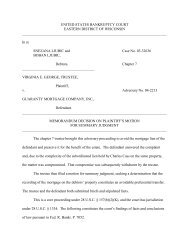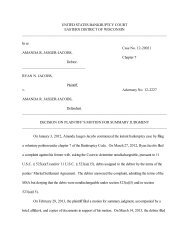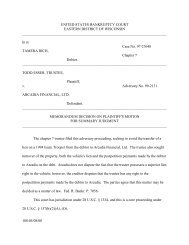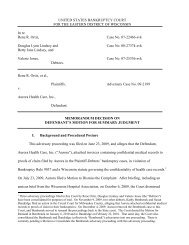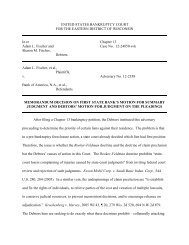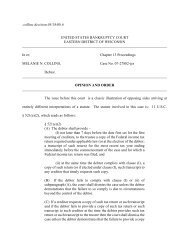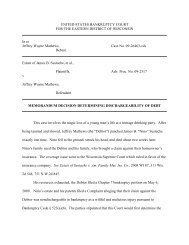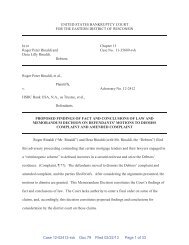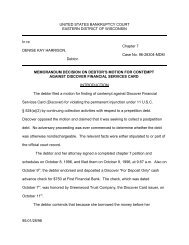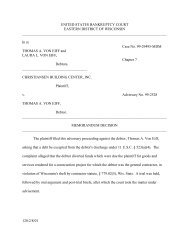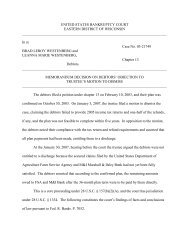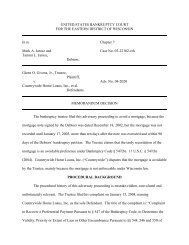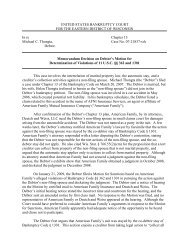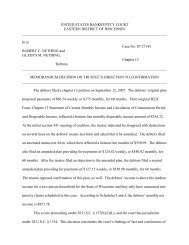Defendant Filed An Answer To The Complaint - Eastern District of ...
Defendant Filed An Answer To The Complaint - Eastern District of ...
Defendant Filed An Answer To The Complaint - Eastern District of ...
Create successful ePaper yourself
Turn your PDF publications into a flip-book with our unique Google optimized e-Paper software.
UNITED STATES BANKRUPTCY COURTEASTERN DISTRICT OF WISCONSIN______________________________________________________________________________In reSTEPHANIE MARIE SCHAUER,Debtor.___________________________________Case No. 07-26758Chapter 7STATE OF WISCONSIN,Plaintiff,v. Adversary No. 07-2317STEPHANIE MARIE SCHAUER,<strong>Defendant</strong>.______________________________________________________________________________MEMORANDUM DECISION ON PLAINTIFF’S MOTION FOR SUMMARY JUDGMENT______________________________________________________________________________<strong>The</strong> plaintiff, State <strong>of</strong> Wisconsin, filed an adversary proceeding under 11 U.S.C. §523(a)(5) seeking a determination that an obligation owed by the defendant, Stephanie Schauer,is excepted from the debtor’s discharge. <strong>The</strong> plaintiff moved for summary judgment on thegrounds that, as a matter <strong>of</strong> law, child care overpayments are domestic support obligations withinthe meaning <strong>of</strong> 11 U.S.C. § 101(14A) and thus nondischargeable pursuant to 11 U.S.C. §523(a)(5). <strong>The</strong> pro se defendant filed an answer to the complaint; however, she has not filed aresponse to the motion for summary judgment.This is a core proceeding under 28 U.S.C. § 157(b)(2)(I), and the court has jurisdictionunder 28 U.S.C. § 1334. <strong>The</strong> following constitutes the court’s findings <strong>of</strong> facts and conclusions<strong>of</strong> law pursuant to Fed. R. Bankr. P. 7052. For the reasons stated below, the plaintiff’s motion isgranted.
BACKGROUND<strong>The</strong> State <strong>of</strong> Wisconsin, through its Wisconsin Department <strong>of</strong> Workforce Development,contracts with the County Human Services’ Departments to administer the Wisconsin Works(W2) Child Care Subsidy program. See Wis. Stat. § 49.155. <strong>The</strong> child care program provides asubsidy to low-income families who require child care to obtain or retain employment. When thedebtor applied for child care assistance, and in subsequent reviews, she was advised orally and inwriting, that she had to report any changes in income within 10 days.According to the plaintiff, the defendant failed to report all <strong>of</strong> her income which, whenconsidered, made her ineligible for the state’s child care program. Under section 49.195(3), Wis.Stat., the state is entitled to recover the overpayment upon notice to the program participant, andthis notice was provided to the defendant.Through the Outagamie County Department <strong>of</strong> Health and Human Services, the plaintiff1calculated the overpayments. <strong>The</strong> gross income limit for child care benefits for a household <strong>of</strong>two during the relevant period, July 2006 through December 2006, was $2,200.00 per month.(Laura Schroeder, Outagamie County Health and Human Services, Economic Support Specialist,Affidavit 3, 4). <strong>The</strong> plaintiff determined the debtor was not eligible for child care paymentsduring the months <strong>of</strong> July, August, September and December 2006 because her total grossmonthly income exceeded the gross monthly income limit for eligibility <strong>of</strong> $2,200.00 (SchroederAffidavit 5). During those months, the county had paid the debtor $535.00 in July 2006,$321.00 in August 2006, $428.00 in September 2006, and $485.00 in December 2006.1<strong>The</strong> plaintiff alleged in its complaint it had overpaid the debtor $3,615.00. After thedebtor filed her answer questioning the calculation <strong>of</strong> overpayments, the county recalculated thepayments received and eligibility figures and revised the total amount overpaid.2
(Schroeder Affidavit 6). <strong>The</strong> plaintiff additionally determined that the debtor was only partiallyeligible for child care benefits during the months <strong>of</strong> October and November 2006 because hergross monthly income was less than $2,200.00, but greater than the amount originally budgetedfor child care benefits. (Schroeder Affidavit 7). Because <strong>of</strong> this, the debtor was paid $535.00in October 2006 and $428.00 in November 2006, when she was eligible to receive only $490.00and $392.00, respectively. <strong>The</strong> debtor received child care overpayments totaling $1,850.00 fromJuly 2006 through December 2006. <strong>The</strong> debtor has not challenged these calculations.ARGUMENTS<strong>The</strong> plaintiff contends the Code’s definition <strong>of</strong> “domestic support obligation” is clear andincludes the debtor’s obligation to repay the state for her child’s care. This is a debt owed to orrecoverable by a governmental unit; in the nature <strong>of</strong> support <strong>of</strong> her child provided by agovernmental unit; established in accordance with applicable non-bankruptcy law by agovernmental unit; and is not assigned to a non-governmental entity. See 11 U.S.C. § 101(14A).Thus, it meets the definition <strong>of</strong> a “domestic support obligation,” which in turn is excepted fromdischarge under 11 U.S.C. § 523(a)(5). While the obligation may not have been excepted fromdischarge under the Code previous to the enactment <strong>of</strong> the Bankruptcy Abuse Prevention andthConsumer Protection Act <strong>of</strong> 2005, see, e.g., In re Platter, 140 F.3d 676, 677 (7 Cir. 1998), theBAPCPA explicitly included, in the definition <strong>of</strong> a domestic support obligation, debts in thenature <strong>of</strong> support, owed directly to or recoverable by a governmental unit.In the defendant’s answer to the complaint, she stated she was unaware holiday bonuseswere considered an increase in salary. She also noted that $60.00 per week was deducted fromher paycheck for health care costs. According to her tax return, the debtor’s adjusted gross3
income for tax year 2006 was $23,958, which is less than the gross income limit for the childcare assistance program.DISCUSSIONSummary judgment is appropriate if “the pleadings, the discovery and disclosurematerials on file, and any affidavits show that there is no genuine issue as to any material fact andthat the movant is entitled to judgment as a matter <strong>of</strong> law.” Fed. R. Civ. P. 56(c); see alsoCelotex Corp. v. Catrett, 477 U.S. 317, 322-23, 106 S.Ct. 2548 (1986). “All facts and reasonableinferences must be construed in the light most favorable to ... the non-moving party.” Mannoia v.thFarrow, 476 F.3d 453, 457 (7 Cir. 2007).A party may succeed on summary judgment by showing that the undisputed facts entitlethe movant to judgment as a matter <strong>of</strong> law, see Adickes v. S.H. Kress & Co., 398 U.S. 144, 159-60, 90 S.Ct. 1598 (1970), or by showing that there is an absence <strong>of</strong> evidence to support thenonmoving party’s case. Celotex Corp. v. Catrett, 477 U.S. 317, 325, 106 S.Ct. 2548 (1986).Under the second method <strong>of</strong> obtaining summary judgment, the movant must show that thenonmovant has insufficient evidence to survive summary judgment. Albiero v. City <strong>of</strong> Kankakee,th246 F.3d 927, 932 (7 Cir. 2001). <strong>The</strong>n the burden shifts to the nonmovant to present suchevidence. Rule 56 sets forth the standard:When a motion for summary judgment is properly made and supported, an opposing partymay not rely merely on allegations or denials in its own pleading; rather, its responsemust – by affidavits or as otherwise provided in this rule – set out specific facts showing agenuine issue for trial. If the opposing party does not so respond, summary judgmentshould, if appropriate, be entered against that party.Fed. R. Civ. P. 56(e)(2).<strong>The</strong> facts set forth in the plaintiff’s affidavit have not been disputed by the debtor. <strong>The</strong>4
court notes that the debtor’s income calculations appear to be monthly averages based on annualincome, whereas the relevant state statute requires consideration <strong>of</strong> actual income on a month bymonth basis to determine a party’s eligibility for the child care program. For purposes <strong>of</strong>summary judgment, the court thus accepts the plaintiff’s figures as accurate.Section 523 <strong>of</strong> the Bankruptcy Code specifies that certain debts are nondischargeable in abankruptcy case. <strong>The</strong> pertinent portions <strong>of</strong> section 523, as amended by the Bankruptcy AbusePrevention and Consumer Protection Act <strong>of</strong> 2005, specify: “(a) A discharge under section 727 ...<strong>of</strong> this title does not discharge an individual debtor from any debt ... (5) for a domestic supportobligation.” 11 U.S.C. § 523(a)(5). BAPCPA added the term “domestic support obligation”(“DSO”) to the Code. Section 101(14A) provides that a DSO is:[A] debt that accrues before, on, or after the date <strong>of</strong> the order for relief in a case under thistitle, including interest that accrues on that debt as provided under applicablenonbankruptcy law notwithstanding any other provision <strong>of</strong> this title, that is –(A) owed to or recoverable by –(i) a spouse, former spouse, or child <strong>of</strong> the debtor or such child’s parent,legal guardian, or responsible relative; or(ii) a governmental unit;(B) in the nature <strong>of</strong> alimony, maintenance, or support (including assistanceprovided by a governmental unit) <strong>of</strong> such spouse, former spouse, or child <strong>of</strong> thedebtor or such child’s parent, without regard to whether such debt is expressly sodesignated;(C) established or subject to establishment before, on, or after the date <strong>of</strong> the orderfor relief in a case under this title, by reason <strong>of</strong> applicable provisions <strong>of</strong> –(i) a separation agreement, divorce decree, or property settlementagreement;(ii) an order <strong>of</strong> a court <strong>of</strong> record; or(iii) a determination made in accordance with applicable nonbankruptcylaw by a governmental unit; and(D) not assigned to a nongovernmental entity, unless that obligation is assignedvoluntarily by the spouse, former spouse, child <strong>of</strong> the debtor, or such child’sparent, legal guardian, or responsible relative for the purpose <strong>of</strong> collecting thedebt.5
11 U.S.C. § 101(14A). <strong>The</strong> term “domestic support obligation” is broad and includes a widevariety <strong>of</strong> obligations. Prior to the 2005 amendments, the Code provided that the debt inquestion must be one owed to a spouse, former spouse or child <strong>of</strong> the debtor. BAPCPAsignificantly modified the treatment <strong>of</strong> nondischargeable support obligations:<strong>The</strong> definition [found in revised section 101(14A)] moves beyond the former Codesection to domestic support obligations that are “owed to or recoverable by ... agovernmental unit.” Thus, assuming that the debt is in fact a domestic support one andthat it meets the other criteria <strong>of</strong> section 101(14A), even though the debt is neither owedto or recoverable by the relatives <strong>of</strong> the debtor, it may be nondischargeable upon acomplaint filed by a governmental unit. Typically, this would mean that if somegovernmental unit had provided benefits that had the effect <strong>of</strong> supporting the debtor’sspouse, former spouse, or child, those benefits would fall within the definition <strong>of</strong>domestic support obligation and would be covered by section 523(a)(5).William Houston Brown, BANKRUPTCY & DOMESTIC RELATIONS MANUAL § 6:4(updated September 2007). In this case, the debt is owed to a governmental unit; is in the nature<strong>of</strong> assistance provided by a governmental unit to a child <strong>of</strong> the debtor; was established by thegovernmental unit in accordance with applicable nonbankruptcy law; and has not been assignedto a nongovernmental entity.When it created the definition <strong>of</strong> a DSO, Congress clearly intended to broaden the types<strong>of</strong> debts that are not subject to discharge. Prior to BAPCPA, only certain governmental supportdebts, primarily those collectible pursuant to the Social Security Act, were excepted fromdischarge under 11 U.S.C. 523(a)(18). <strong>The</strong> new definition encompasses all debts to agovernmental unit related to support, such as the child care subsidy at issue here, and 11 U.S.C. §523(a)(5) provides the exception from the debtor’s discharge. <strong>The</strong> definition is broader in otherways not relevant here, in that it applies to obligations to an expanded group <strong>of</strong> individualsproviding support for the debtor’s dependants, and it also applies to obligations that come due6
after the date <strong>of</strong> filing. Numerous other code provisions were impacted as well, generally withthe result that even more <strong>of</strong> these obligations cannot be avoided by bankruptcy debtors.Consistent with this policy, this debt clearly falls within the category <strong>of</strong> nondischargeable debts.Since the State’s calculations are not refuted, it is entitled to a nondischargeable judgment in theamount requested.A separate order for judgment will be entered accordingly.June 13, 2008Margaret Dee McGarityChief Judge, U.S. Bankruptcy Court7



